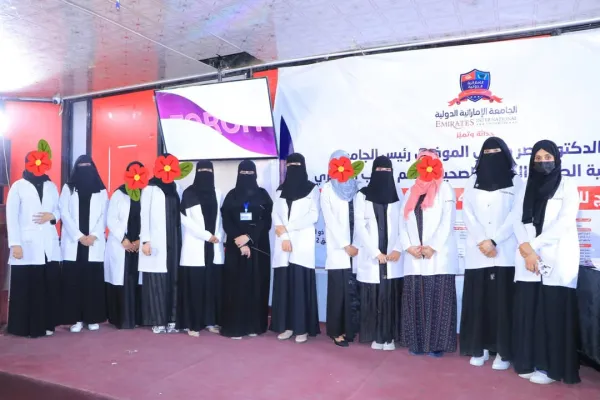Students from the Department of Laboratory Medicine completed a qualitative scientific study on TORCH infection and its impact on recurrent pregnancy loss in Sana'a.

Students from the Department of Laboratory Medicine Complete a Qualitative Scientific Study on TORCH Infection and Its Impact on Recurrent Pregnancy Loss in Sana'a
University Media
Yesterday, Monday, the Emirates International University witnessed the discussion of a distinguished scientific graduation project by students from the Department of Medical Laboratory Medicine, entitled: "Seroprevalence of TORCH Infection Among Pregnant Women with Recurrent Pregnancy Loss in Sana'a, Yemen, 2025." This project is one of the fruits of the college's research excellence and embodies the university's approach to linking its scientific outputs to the health needs of society and promoting purposeful applied research.
The research project was presented by eleven outstanding students: Raghda Mohammed Abdullah Mohammed Al-Najhi, Maria Fadl Saleh Ali Abdullah, Buthaina Fouad Mohammed Mohammed Al-Adini, Nismah Muath Ahmed Abdul Rahim Al-Drain, Hajar Wafd Faisal Mahfouz Khalifa, Duaa Khalil Taha Abdul Jabbar Al-Ghouri, Maria Mohammed Ahmed Saif, Jamila Ahmed Ahmed Al-Mukhdari, Ibtihal Khaled Mohammed Ahmed Al-Fishani, Iman Khaled Hussein Yahya Sharaha, and Ahlam Abdullah Abdul Qader Ali. The project was supervised by Associate Professor Dr. Anas Al-Mahbashi.
The examination committee consisted of: Assistant Professor Dr. Anas Al-Mahbashi, Associate Professor, Principal Supervisor; Professor Dr. Saleh Al-Dhaheri, Professor, External Examiner; and Dr. Taha Al-Nasari, Assistant Professor, Internal Examiner.
The project focused on studying the prevalence of TORCH infection, a group of pathogens that are often silent during pregnancy but are associated with serious complications such as congenital malformations, recurrent pregnancy loss, and intrauterine fetal death. The study included an analysis of 200 blood samples from pregnant women who had experienced recurrent miscarriages. The results revealed that approximately 80% of them had TORCH infection to varying degrees.
The results showed that Toxoplasmosis was the most prevalent at 19.5%, followed by herpes simplex virus 1 and 2 at 15.7%, rubella virus at 6.9%, and finally cytomegalovirus at 1.3%. The analysis also showed that the 21-30 age group was most susceptible to infection, and that blood type O and Rh positive constituted the majority of infected samples.
The study was not limited to laboratory analysis only; it also included an analysis of influential demographic and medical factors. It was found that not being vaccinated against rubella, a family history of miscarriage, the presence of pets, and the use of medications during pregnancy were the most prominent factors associated with infection.
This scientific achievement reflects the high level of academic and practical qualifications provided by the Emirates International University to its students and demonstrates their ability to produce quality research that addresses critical health issues in Yemeni society.
Through its academic colleges, the Emirates International University continues to promote applied scientific research and encourage projects that address national challenges and contribute to improving the quality of life, proving once again that it is not only a center of learning, but also an effective partner in health and community development.
Website:
https://eiu.edu.ye
#Emirati_International_University
#Modernity_Excellence
#EIU
